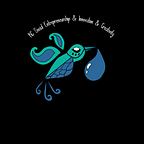SDG 13 Climate Action Challenge Workshop 4: Problem Definition & Ideation
Author: İpek (Grade 9)
Editor: Barış (Grade 12))
RC Social Entrepreneurship, Innovation, and Creativity Office (RC SEIC) organized the fourth design thinking workshop on problem definition and ideation with SDG 13 Climate Action Challenge Teams. UN Volunteers Turkey Country Coordinator Nil Memişoğlu honored our circle with her presentation on volunteerism.
How to Determine the Actual Problem?
Teams started by watching a video about Veronika Scott’s passion project, which aimed to help the homeless in Detroit. She initially thought of the main problem as people’s vulnerability to weather conditions, and thus designed a multi-functional coat that can be converted into a sleeping bag. When she tested this product on homeless people, it was understood that those people didn’t need a coat. Instead, they needed jobs to afford a coat. So, Scott created employment opportunities for them in the coat manufacturing factory, which ultimately created a more sustainable solution.
Reflecting on the video, teams understood that design thinking was a circular and a non-linear process. As a community who is trying to understand the philosophy of social entrepreneurship, Ms. Oğuz’s statement regarding an important aspect of the video resonated with us:
“Social entrepreneurship is not about helping people; it is about empowering them!”
Writing and Refining Problem Statements
Later, teams went into the breakout rooms to write a problem statement for their projects. Ms. Oğuz advised them to start with attainable problems instead of big ones. Then, teams shared their problem statements with the big circle in order to get feedback. Based on the feedback, some teams needed to go back to the empathy stage to deepen their research and insights. This will make them experience the cyclical process and help them close the circle.
Ideate!
Next, teams were introduced to the third stage of design thinking, ideation. In this step, they were supposed to find a solution to their predefined problem by building up on each others’ ideas. First, they came up with 40 radical solutions suspending judgment. Then, they step by step eliminated those into 1 actionable solution. During this process, teams practiced 3 essential thinking skills:
- Divergent thinking: Generating creative ideas by thinking out of the box.
- Convergent thinking: Deriving the correct and the rational idea
- Emergent thinking: Exploring completely unforeseen possibilities while comparing/contrasting ideas
Volunteerism: Connecting with Our Communities
Nil Memişoğlu, UN Volunteers Turkey Country Coordinator, continued by giving a presentation on volunteerism. She believes that volunteerism is a journey from I to us, a journey to learn your inner self.
Highlighting the interconnectedness of communities, Atatürk famously stated: “Peace at home, peace in the world!” Following this vision, Ms. Memişoğlu views volunteerism as a tool to build peaceful communities.
Unfortunately, we lost approximately a decade in achieving UN Sustainable Development Goals due to Covid; so, Ms. Memişoğlu urges everyone to act faster. She also calls governments to make volunteerism a part of school curriculum and says that being a volunteer at a young age empowers people to make volunteerism an integral part of their adult life. Ms. Memişoğlu shared statistics from the State of the World’s Volunteerism Report, showing that there are 109 million full-time volunteers in the workforce. 70% of these volunteers are indirectly supporting NGOs, which indicates that there is a huge number of people who are inclined to be volunteers.
UBUNTU: Feeling of a Community
Ms. Memişoğlu introduced us to a social experiment conducted in an African tribe by an anthropologist. This anthropologist put a basket of fruits under a tree. He gathered all children and said, “Whoever gets there first can eat those fruits!” Surprisingly, the children ran by holding each other’s hand. Thus, they ate the fruits together. When the conductor asked a girl why they didn’t run separately, she replied:
“How can one of us be happy if all the other ones are sad?”
Emphasizing the sense of being a community, Alfred Adler, a psychotherapist, calls this insightful message the UBUNTU experiment:
“In order to live a meaningful life, one should contribute to its community.”
Our Debt to This World: Skills and Passions
Ms. Memişoğlu concluded her presentation by sharing the poem “For Whom the Bell Tolls” by John Donne. It reminded everyone of the meaning of life. Being a unique part of a big community and caring about each other were pointed out as well. During the discussion, teams came to the conclusion that individual’s debt to this world is their skills and passions.
We would love to hear your take-aways and questions in the comments section below.
